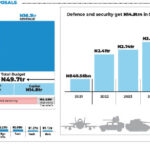President Bola Ahmed Tinubu, last week, signed a Bill on Higher Education Bank to grant loans to indigent students. The Bill had been hibernating between the National Assembly and The Presidency since 2016. In principle, the new law, sponsored by Femi Gbajabiamila, the immediate past Speaker of the House of Representatives and now Chief of Staff to the President, is a welcome development, as it has the potential of giving many young Nigerians access to higher education.
The new law has been enacted on the graves of two similar laws, the defunct Students Loan Board and Nigerian Education Bank, which collapsed due to leakages, defaults, outright mismanagement, and policy somersault. Shedding light on the significance of the law, the Permanent Secretary of the Ministry of Education, Mr David Adejo, said last week that: “The Act is to make sure that every Nigerian has access to higher education through what is called the Higher Education Nigerian Bank. Learning from past mistakes, the bank is not going to be the type that will sit down and be collecting applications for loans. It will also perform normal banking functions and make sure loans are given and [repaid], because we had issues with loan recovery in the past.”
The idea of student loans scheme is not peculiar to Nigeria, as several countries have versions of it, but mainly targeted at ensuring that their citizens have access to higher education. In Germany, citizens and even international students do not pay tuition fees for higher education; indigent students use hostels, while students from middle class or rich homes pay for their own accommodation. In the United Kingdom, the student loan is available to citizens, but it has been discovered that its repayment is an albatross on the neck of many graduates, as it prevents them from freely utilizing their income for years after graduation. In the UK the debt has surpassed £200 billion, as beneficiary graduates, on the average owe as much as £45,000. The issue will become a battleground in the next UK elections. In the United States, the students’ loan is not restricted to indigent students, therefore, parents encourage their children to take it, as a way of instilling discipline in them.
It is feared that the new law presupposes the introduction of tuition fees and financial autonomy in higher institutions. For this to happen, Section 18(3) of Chapter 2 of the 1999 Constitution of the Federal Republic of Nigeria needs to be repealed. That section states categorically that education is free, and it is illegal for institutions to charge tuition fees. It says: “Government shall strive to eradicate illiteracy; and to this end Government shall as and when practicable provide a. free, compulsory and universal primary education; b. free secondary education; c. free university education; and d. free adult literacy programme.” If by the new law, government has decided to desist from funding higher education, there will be serious consequences, some of them not foreseen at the moment.
- How litigations make Nigeria’s elections expensive
- Why Nigerian leather industry collapsed – Danyaro
Also, government has not explained the role that Tertiary Education Trust Fund (TETFUND) shall play in the unfolding dispensation, considering a section of the new law that says certain percentages of earnings from diverse sources shall be channeled into the Higher Education Bank. Section 16 of the Act says the bank shall be funded through “interest arising from deposits in the bank; education bonds; education endowment fund schemes; 1 per cent of all taxes, levies and duties accruing to the government of the Federation from Federal Inland Revenue Services (FIRS), Nigerian Immigration Services and Nigerian Customs Services; 1 per cent of all profits accruing to the government of the Federation arising from oil and other minerals,” etc. It is important for government to clarify the roles of other educational intervention institutions, viz-a-viz this new law.
The students loan law says those who qualify for the loan are students whose parents earn less than N500,000 in a year. With more than 133 million Nigerians living below poverty line, and the minimum wage still hanging at N30,000 per month, government must brace up for a deluge of applications for this loans. Also, the idea of ensuring that beneficiaries begin repayment of the loan two years after the completion of their National Youth Service Corps (NYSC) seems impracticable, as three or four years after completing higher education, thousands of graduates still lack jobs. For this section of the law to be effective, government must implement drastic fiscal policies that would boost the economy and create jobs, a task that sounds like a tall order in contemporary Nigeria. Also, the law did not state how much a student can take as loan. What happens where the tuition fee is well above the amount the student can access? There is also the issue of a guarantor for the loan; there are students and prospective university students out there who may not be able to provide someone in the position of Director to stand in for them.
In view of all these, we call on the government to return to the drawing table to tackle inherent challenges that will come with the implementation of this law. If universities charge exorbitant fees in order to meet their financial needs, thousands of students would drop out. Therefore, we call for an eclectic approach to the implementation of this law, such that government must continue to fund capital projects in higher institutions while recurrent expenditures are funded from moderate tuition fees, if introduced. The average Nigerian is facing multiple burdens from failure of government to provide social infrastructure. The introduction of ‘commercial tuition fees,’ as charged by private universities, may seem like the average household being thrown into the sea with a milestone tied around their neck.

 Join Daily Trust WhatsApp Community For Quick Access To News and Happenings Around You.
Join Daily Trust WhatsApp Community For Quick Access To News and Happenings Around You.


